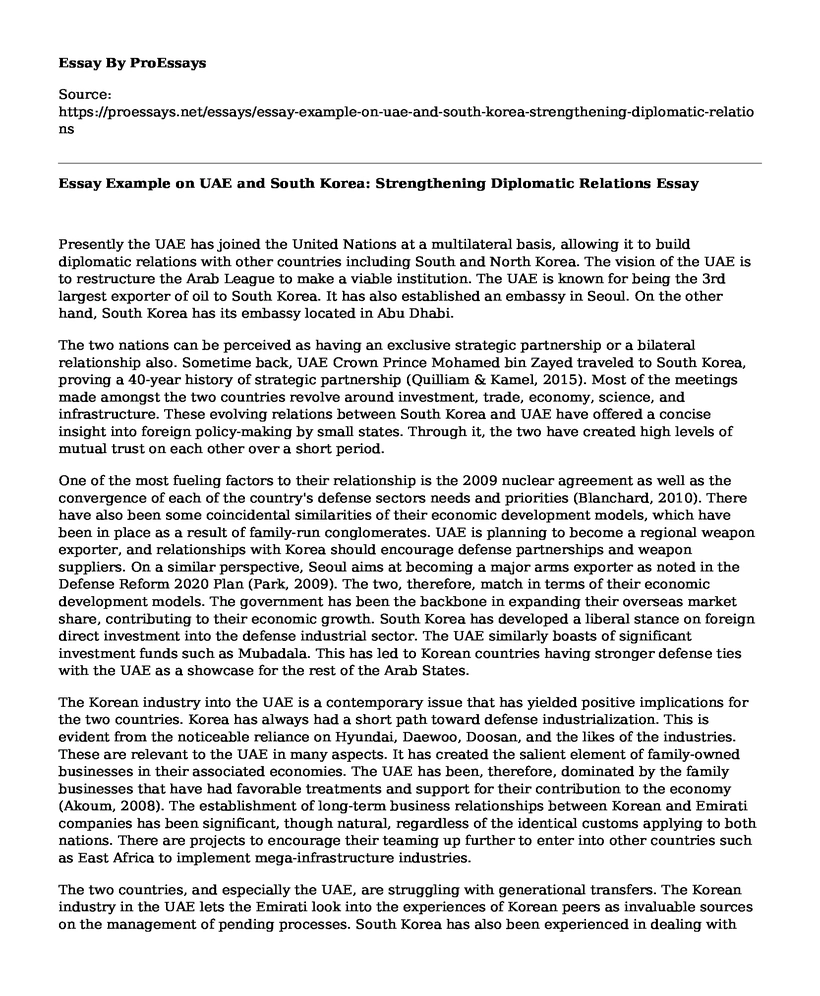Presently the UAE has joined the United Nations at a multilateral basis, allowing it to build diplomatic relations with other countries including South and North Korea. The vision of the UAE is to restructure the Arab League to make a viable institution. The UAE is known for being the 3rd largest exporter of oil to South Korea. It has also established an embassy in Seoul. On the other hand, South Korea has its embassy located in Abu Dhabi.
The two nations can be perceived as having an exclusive strategic partnership or a bilateral relationship also. Sometime back, UAE Crown Prince Mohamed bin Zayed traveled to South Korea, proving a 40-year history of strategic partnership (Quilliam & Kamel, 2015). Most of the meetings made amongst the two countries revolve around investment, trade, economy, science, and infrastructure. These evolving relations between South Korea and UAE have offered a concise insight into foreign policy-making by small states. Through it, the two have created high levels of mutual trust on each other over a short period.
One of the most fueling factors to their relationship is the 2009 nuclear agreement as well as the convergence of each of the country's defense sectors needs and priorities (Blanchard, 2010). There have also been some coincidental similarities of their economic development models, which have been in place as a result of family-run conglomerates. UAE is planning to become a regional weapon exporter, and relationships with Korea should encourage defense partnerships and weapon suppliers. On a similar perspective, Seoul aims at becoming a major arms exporter as noted in the Defense Reform 2020 Plan (Park, 2009). The two, therefore, match in terms of their economic development models. The government has been the backbone in expanding their overseas market share, contributing to their economic growth. South Korea has developed a liberal stance on foreign direct investment into the defense industrial sector. The UAE similarly boasts of significant investment funds such as Mubadala. This has led to Korean countries having stronger defense ties with the UAE as a showcase for the rest of the Arab States.
The Korean industry into the UAE is a contemporary issue that has yielded positive implications for the two countries. Korea has always had a short path toward defense industrialization. This is evident from the noticeable reliance on Hyundai, Daewoo, Doosan, and the likes of the industries. These are relevant to the UAE in many aspects. It has created the salient element of family-owned businesses in their associated economies. The UAE has been, therefore, dominated by the family businesses that have had favorable treatments and support for their contribution to the economy (Akoum, 2008). The establishment of long-term business relationships between Korean and Emirati companies has been significant, though natural, regardless of the identical customs applying to both nations. There are projects to encourage their teaming up further to enter into other countries such as East Africa to implement mega-infrastructure industries.
The two countries, and especially the UAE, are struggling with generational transfers. The Korean industry in the UAE lets the Emirati look into the experiences of Korean peers as invaluable sources on the management of pending processes. South Korea has also been experienced in dealing with and stopping the influence provided by chaebols. This is something that the UAE is aware of, and the government is supportive of it. The family owns businesses for the UAE have been more apt at stifling competition and innovation, just like Koreans do (Akoum, 2008). The Korean industry in the Emirati has led to more partnerships and more excellent prospects of a post-oil economy, as well as a greater need for innovation.
References
Akoum, I. F. (2008). Conducting business in the UAE: a brief for international managers. Global Business and Organizational Excellence, 27(4), 51-66.
Blanchard, C. M. (2010). United Arab Emirates Nuclear Program and Proposed US Nuclear Cooperation. Collingdale: Diane Publishing.
Park, S. Y. (2009). The development of the Republic of Korea navy in a changing national defense and Northeast Asian security environment. Salford: University of SalfordQuilliam, N., & Kamel, M. (2015). The GCC-Asian relationship: from transaction to strategy. East Asia, 32(3), 323-339.
Cite this page
Essay Example on UAE and South Korea: Strengthening Diplomatic Relations. (2023, Feb 20). Retrieved from https://proessays.net/essays/essay-example-on-uae-and-south-korea-strengthening-diplomatic-relations
If you are the original author of this essay and no longer wish to have it published on the ProEssays website, please click below to request its removal:
- Research Paper on Feminism and Marxism in the Brave New World
- Critical Essay: Should English be the Worlds International Language?
- Financial Benefits and Corporate Social Responsibility on Job Engaged for an International Employee Working in Taiwan
- Essay on Honoring the Efforts of All Involved for Accessible Toronto Libraries
- Paper Example on Public Policy: A Guide to Governmental Decision-Making
- Political Trends: Nationalism, Populism, Anti-Globalization - Essay Sample
- Essential Soft Skills for Workplace Success: A Comprehensive Evaluation







